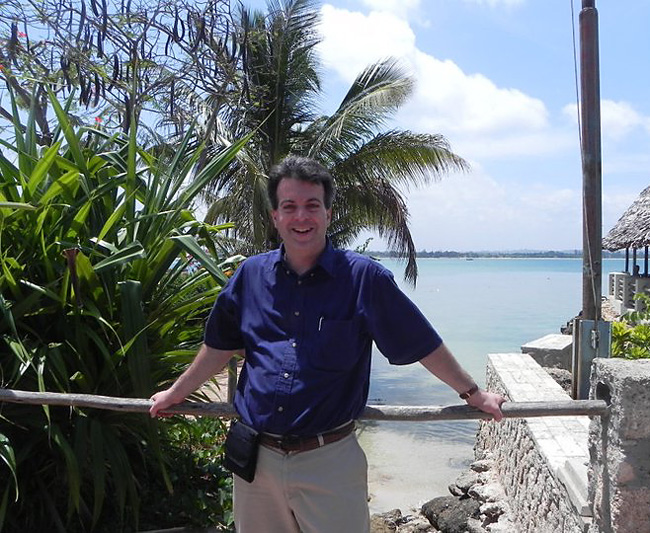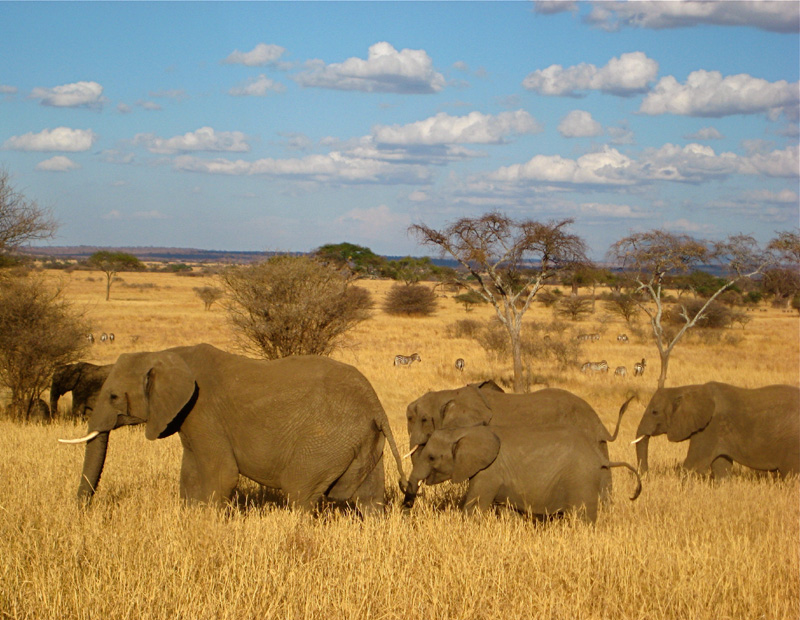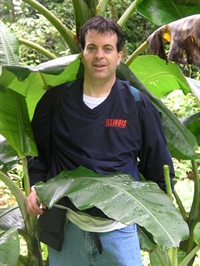When it comes to studying biodiversity, small is beautiful for Monmouth College biology professor James Godde. Really small, as in microbes.
Biodiversity is all about adapting to the surrounding environment, Godde noted, and “microbes have been doing it for billions of years.”
 James Godde in Dar es Salaam, Tanzania.
James Godde in Dar es Salaam, Tanzania.
This fall, Godde will serve as Director of the ACM Tanzania: Ecology and Human Origins program, where he will teach a course in Research Methods and advise students on their independent field projects.
So, while he typically takes a more molecular view of the world – scientifically speaking, at least – Godde will be adjusting his sights “up a level” in Tanzania to focus more on the multi-celled organisms for which the country is famous.
The field research component of the program takes the Director and students to Tarangire National Park, where biodiversity is abundantly on display. There are the herds of large mammals – wildebeests, zebras, elephants – along with baboons, birds, reptiles, insects, and wide-ranging types of vegetation. All have been the subjects of students’ research projects over the years. Students also have pursued wide-ranging research in archaeology, anthropology, and geology.
Whatever the size of the organism, though, “the same basic principle is involved,” Godde said. “How do they adapt? How do they survive in this environment?”
“There are some pretty diverse interests that bring students to Tanzania,” said Godde, “so the Research Methods course will encompass the life sciences and the social sciences.” Students also take courses in Human Evolution, Ecology of the Maasai Ecosystem, and Kiswahili Language, all of which are taught by professors at the University of Dar es Salaam, the program’s host institution.
Godde is comfortable working with students in disciplines outside biology, whether it’s in the classroom, on off-campus study, or working with students on their independent research. “All of the ACM colleges have this liberal arts approach in which we’re talking to people outside of our areas, so you get a broader understanding of different approaches,” Godde said. While the details of the students’ research projects will vary, he noted, the underlying process of writing a proposal and conducting research crosses disciplinary boundaries.
 In the Northern Region of Tanzania during the field research phase of the program.
In the Northern Region of Tanzania during the field research phase of the program.
Photo courtesy of Ethan Mamer
When he visited Tanzania this past November, Godde had a chance to talk with students who had just returned from conducting field research in the country’s Northern Region. It was clear, he said, that the time in the field was a compelling experience for the students.
“I’m a big fan of experiential learning,” said Godde. “I love to get students away from our campuses to an interesting place where they can learn something that they couldn’t get from a lecture or being in class.”
He has taken the initiative several times to create courses that have included off-campus travel, leading groups of students to Japan, Costa Rica, and the western U.S. This spring, he has a trip on tap to study biodiversity in the Galapagos Islands.
Godde’s most recent off-campus endeavor was a course in Environmental Microbiology this past summer. The group took the train from Monmouth to California and back in search of “extremophiles” – microbes that live in extreme environments. Stops included the Great Salt Lake (organisms that live in salty conditions), Yellowstone National Park (the extreme heat of geysers and hot springs), California’s Mono Lake (alkaline, or high pH conditions), and a gold mine in Colorado (acidic conditions). They collected samples to investigate, trying to figure out what was living in each location.
“There’s really no place on earth where you can’t find something living,” said Godde. “We had these really hot geysers and took samples out of them and found DNA. There are organisms that can survive in those conditions.”
How do the organisms survive? “They have to adapt,” Godde explained. “They need to change their internal make-up so it can deal with those conditions. These extremophiles have proteins and nucleic acids that have different structures. If you’re into molecules, it’s really interesting, because molecules are different in these kinds of organisms so that they can tolerate those kinds of conditions.”
 Visiting the rainforest during an off-campus study trip James Godde led to Costa Rica.
Visiting the rainforest during an off-campus study trip James Godde led to Costa Rica.
As they rolled through the mountains, deserts, and plains, Godde and the students held discussion sessions in the train’s observation car. Back on campus during the fall semester, several of the students continued their investigations in the laboratory, analyzing the samples they had gathered on the trip.
All of Godde’s off-campus trips have been relatively short, in the range of one to two weeks on the road. While these short-term programs are certainly valuable and eye-opening for students, he noted, there are limitations.
“On the short trips, you really just get a tiny taste of it,” Godde said. “You wish you had more time. I think it will be nice to have a much longer time [on the semester-length Tanzania Program] to be able to do some research and be able to learn from these experiences. Is it always going to be easy? No. But I think that’s part of the experience.”
It’s abundantly clear that everywhere Godde takes students, he brings enthusiasm, a sense of adventure, and a healthy dose of curiosity. “I try to be an example of a life-long learner and someone who has diverse interests,” he said. “In an off-campus experience, I think students actually see that in you and understand it on a whole different level.”
Looking ahead to this fall and serving as Director of the Tanzania Program, Godde reflected on the similarities between off-campus study and scientific research, with its trials and errors, disappointments and triumphs.
As with science, he said, “off-campus study takes a lot of patience, and things don’t always work out the way that you expect them to. But then, the couple of times that things do work out, they work out well. You discover something amazing about what you’re working on or about yourself. It should be really interesting.”
Links:
- ACM Tanzania: Ecology & Human Origins program
- More about James Godde on the Monmouth College website and the Tanzania Program webpage
- Field research topics by past participants on the Tanzania Program








